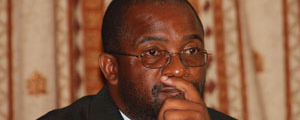
THE MDC-T will this week hold a three-day policy conference in Harare from May 17 to 19 as preparations by political parties towards the make-or-break elections gather momentum.
NewsDay Chief Reporter Everson Mushava (ND) caught up with party spokesperson Douglas Mwonzora (DM) to discuss the importance of the conference among other issues. Below are excerpts from the interview.
ND: Hon Mwonzora, critics of your party say you have come up with this policy conference to plug gaps left by the Jobs Upliftment Investment Capital Ecology (JUICE) which has allegedly failed to lure supporters for the party ahead of elections. What would be your comment to that?
DM: First, I want to set the record straight that the policies announced by the MDC are designed by the party. We have never outsourced ideas as our critics would want to suggest. As a party, we have enough intellectual depth to craft policies without outside assistance.
As a matter of fact, JUICE, is an economic blueprint which was well received by Zimbabweans. However, it does not contain all the policies. We are holding a policy conference to debate on social, political as well as economic policies.
Policy proposals will be debated at all levels of leadership in the party. The conference will lead to the production of two documents, the MDC policy document which is an agenda for the new Zimbabwe and the MDC election manifesto.
The conference is a culmination of more than two years of consultation with trade unions, civil society, students’ movement, business associations, political structures of the party, local government and various ministries.
This consultation led to the party producing various proposals. These proposals will form the bedrock of the MDC government. In other words, they will show how the MDC proposes to govern Zimbabwe. They define some fundamental aspects of what type of government Zimbabwe should have.
- Chamisa under fire over US$120K donation
- Mavhunga puts DeMbare into Chibuku quarterfinals
- Pension funds bet on Cabora Bassa oilfields
- Councils defy govt fire tender directive
Keep Reading
ND: Your party has been accused of being a Western puppet which intends to “reverse the gains of independence” by giving back farming land to the white minority. What is your party’s policy on land?
DM: That is not true. The policy conference will answer basic questions like the land issue. Our land policy document will define such important things as security of tenure for all farmers.
It will define how we propose to support and empower all Zimbabwean farmers, mostly the resettled farmers with such things as access to farming loans, research and development as well as basic technical agricultural know-how.
Our land policy will solidify our principle of one-person-one-farm. It will also consolidate such issues as the land audit and land commission.
ND: You said you would debate on social policies. Can you elaborate on the issues that the party would put into focus.
DM: Under our social policy, we will look at aspects like health. We want access to good health facilities for all our citizens. Our social policy will also define the party’s policy on education like making it a basic human right.
This will include pupil and student support through provision of bursaries and scholarships for gifted and indigent pupils and students, cognisant of the sorry state of our universities and the deplorable living conditions for students. The MDC government will establish student support mechanisms which will include the provision of grants and loans.
The policy will include our policy on labour. We will deal with the issue of fair and safe labour standards. The conference will also debate on the party’s commitment to provision of fair and decent wages – a living wage above the Poverty Datum Line.
The MDC government will respect the social contract as well as the institution of collective bargaining for both public and private sector workers. It will also deal with the harmonisation of labour laws in Zimbabwe and provide for the fundamental rights of workers.
The social policy will also focus on housing. It is the aim of the MDC government as a social democratic party to provide decent and affordable housing for all Zimbabweans. The right to shelter will be given effect as the fundamental human right. In the first 100 days in office, Zimbabwe will see the housing backlog significantly reduced.
Under the security policy, the MDC government will make sure that all security services are fully professionalised and equipped. Most of our security services shall be fully computerised to be equipped with modern instruments with which to do their job.
We will also make sure that the welfare of security services is made paramount. All members of security services shall be entitled to decent housing for themselves and their families. Conditions of service shall be improved to international standards. These conditions shall be benchmarked against the best in the world. All security services shall be enjoined to be professional, non-partisan and to respect full fundamental human rights.
ND: As an MDC government, would you briefly explain how you aim to achieve this given the difficult economic environment.
DM: The policy document will show how the MDC intents to achieve these objectives. We will continue to pursue the various benchmarks of the MDC government cognisant of the high unemployment rate in Zimbabwe which now stands at 85%. The MDC will create one million jobs within five years of government.
The policy document will explain how Zimbabwe, under MDC government, will be made a safe investment destination thus attracting both foreign and local investors. It also deals with the formalisation and development of the informal sector; especially how the informal sector will play a positive part in the mainstream economy.











